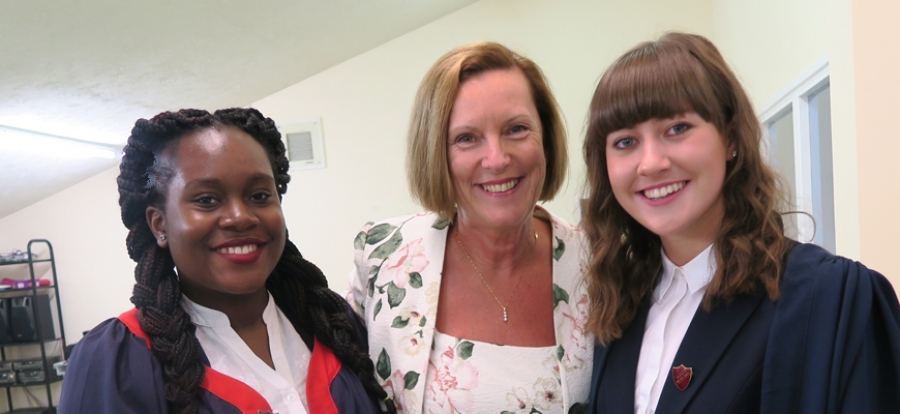I always wanted to teach! I remember playing ‘school’ as a child and always pushing to be the teacher. I’m really not sure why – there were no teachers in my family. The family profession was the police force (father, two brothers, two sisters-in-law).
English was my favourite subject, and as I completed my degree I realised I wanted a career that allowed me to continue to use my subject, to communicate my enthusiasm for it and to carry on developing my understanding of it and the breadth of my reading. Becoming a Secondary English teacher fitted the bill.
It wasn’t all plain sailing, though. I found my first year quite tough. It was a good "I went straight from my degree to a PGCE to a job in teaching at 22."comprehensive school and I was supported, though this was 1980 when there wasn’t a huge degree of collaboration about what and how we taught. I found I was working extremely hard and felt exhausted much of the time. But it did get easier, and became more enjoyable. I’m VERY pleased I stuck with it.
2. How long was it until you became a school leader?
I was promoted quite quickly – a scale 2 (as it was called then) for additional responsibility within the English department in my second year, and then the opportunity to take on a pastoral leadership role from year four. After five years and a term I moved to another school to be Second in English, then my third school as Head of English, my fourth as Head of Sixth Form, my fifth as deputy head, a job I did for five years before moving to my last school as head in 2000. It took me twenty years to get to headship, a job I did for ten years until 2010.
I was 41 when I got my headship, and felt like quite a young head at that time. I think people can reach headship considerably earlier these days, and that’s no bad thing. The skills you develop as a middle leader / senior leader can provide a firm foundation for headship, so I’m not sure it needs to take twenty years, especially if you have other life/professional experience. I didn’t. I went straight from my degree to a PGCE to a job in teaching at 22.
3. What was the best part of being a school leader that you didn’t have as a teacher?
It seems to me that it’s all about ‘spheres of influence’. As a teacher of English in the early days my sphere of influence covered the pupils I happened to be timetabled to teach, plus the group I was a tutor for. In my pastoral role I worked with a Head of House and a team of tutors to oversee the wellbeing of the pupils in our House, and to support their achievements within and beyond the classroom, including reinforcing high standards of behaviour and discipline, liaising with other staff and with outside agencies. I learnt a huge amount in this role, and could see how the responsibility was allowing my sphere of professional influence to expand.
As a second in English/Head of English I worked with and through colleagues in the department to achieve the best we could with pupils across all English classes.
As head of Sixth Form, the focus was supporting and challenging all sixth form students to aim high and achieve all they could. Then as deputy head with a whole-school brief – I was the single deputy in a school of 1100 pupils aged 4-18 – the parameters were very wide, but I wasn’t involved in and responsible for everything. As a head, I was! You have the capacity to influence every element of the school’s operation and are increasingly involved in strategy and public relations. I loved this. It seemed to me that I was able, and privileged, to make a difference to the lives of children and adults on a scale unlike any other I’d ever known. It IS a weighty responsibility, but I also found it a joyful opportunity.
4. What kind of challenges did you face as a school leader, and how did you tackle them?
When I moved to be a deputy head I had an extremely wide brief and was involved in a large number of different things. It was more operational than strategic – I did a lot of problem-solving and dealing with whatever might be causing an issue for teachers, tutors, and Middle Leaders, supporting them so that they could focus on the job of teaching and leading their teams. I was responsible for day to day communication and ensuring the smooth running of many of the school events. The challenge was being versatile and adaptable and not phased by the unexpected!
I also deputised for the head; when she was out of school people looked to me and I assumed the head’s responsibilities. This was an interesting challenge and a fascinating experience. It enabled me to try out what being a head might feel like, albeit temporarily and knowing there was always the backup if I had to face anything really tricky – the head could always be contacted and consulted. She would come back to school if she needed to (though I don’t think that ever needed to happen).
I realised I was ready to be a head when I recognise that I enjoyed this opportunity and was looking forward to having that full responsibility. I liked and respected the two heads I deputised for – I think it must be difficult if you don’t see eye-to-eye and disagree with the way they enact the role, but that wasn’t "I’d recommend heads make time to read, and preferably to write, blogs."the case. However, after five years I was ready to make the leap myself.
5. What led to you becoming a leadership consultant and author?
When I became a head I was asked at interview how long I would probably remain in that role, and I found myself saying “Ten years.” This was a 7-18 girls’ school and it took eleven years for a girl to progress from Year 3 to Year 13. It seemed to me that 10 years would give me time properly to introduce and embed any changes I felt were right for the school, and to make a substantial contribution – this was a school which had been founded in 1882, and I was only its eighth head. Every head is a ‘caretaker’ of the vision for a relatively short period in a school’s history.
I thought, after 10 years, a school might be ready for a different school leader than the one who had seemed the right choice a decade before – someone with a different skill set. Much as I loved headship, by year ten I was ready to move to a fresh challenge, and I think the school was also ready for a change of leadership.
I was 52 by this time, not really retirement age, but didn’t want to move to a second headship or another high-powered job in education. So I professionally reinvented myself! I completed a professional doctorate, researching the transition from deputy to head – a transition I had always found fascinating. I negotiated a contract with Crown House to produce a book based on my research and experience: Making the Leap – Moving from Deputy to Head was published in November 2016. I also write for various other online and print media, and work as a leadership consultant supporting serving and aspiring leaders at all levels.
I had various contacts from my time as a deputy and head, which has led to a range of consultancy work in schools and for organisations, and I found that if I did work which was well-received it tended to lead to other opportunities and invitations. The world of Twitter and blogging has also been a great way of expanding my professional networks and has generated all sorts of new experiences, for which I am very grateful!
6. Tell us about your favourite resources and activities for the role of head.
There are many great educational books out there – I’m a fan of John Tomsett, Andy Buck, Mary Myatt, and Stephen Tierney, for example, who have all written books about leadership recently. When I was a head I struggled to read much in term time, but would always read one significant book about education in each of the longer school holidays. These are the kinds of authors I would recommend.
I think blogs are useful, too, and clearly much quicker to read. There are recently appointed heads, like Chris Hildrew and Helena Marsh, who write brilliantly about their leadership journey and what they are experiencing and learning. @staffrm is an excellent platform for educators to share ideas and reflections. I would certainly recommend heads make time to read, and preferably to write, blogs which can be a useful way of processing your learning - because you do continue to learn throughout your headship, and you have to find time for some structured reflection so that you’re not just completely subsumed by the act of doing the job.
For the same reason, in terms of ‘activities’, I think it’s a really good idea for every head to have a mentor or coach with whom they can have occasional conversations about challenges and opportunities, so they give themselves time to do some careful thinking about how their leadership journey is developing. Heads also need to make sure they have an annual structured professional review where they have the opportunity to reflect on how they’re doing the job, how they might do it differently/better, what support they need, what priorities they should be focussing on in the year ahead, and so on. Professional review/performance management/appraisal, or whatever you call it, really shouldn’t just be about reacting to targets set by others.
7. If you had one piece of advice for school leaders, new and established, working today, what would it be?
I think it would be to ensure you never lose sight of the perspectives of those you lead. Leadership, to me, is about seeing the best in, and getting the best from, individual members of your team so that the whole is greater than the sum of its parts. And I think you can only really do that if you’re able to stand in their shoes and empathise with their position.
So keep in touch, and in tune, and you will be a better leader, at all levels, for that.
Are you a school leader? Add your thoughts in the comments below!


















